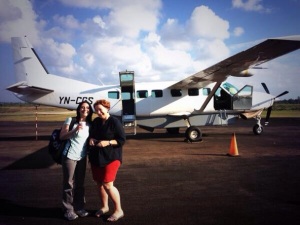By Caitlin Kelly
Interesting piece in The New York Times recently about a college class that teaches students about philanthropy:
Vinay Sridharan must make it through microeconomic theory and the writings of Proust before the end of his senior year at Northwestern in June. But in one course, the final project is far less abstract: give away $50,000.
It is also far more difficult than it may seem.
This course in philanthropy, endowed with a grant from a Texas hedge fund manager, requires students to find and investigate nonprofit organizations and, if they stand up to scrutiny, give them a portion of the five-figure cash pot.
“I didn’t realize they had real money to give,” said Margaret Haywood, the director of work force development at the Inspiration Corporation, a Chicago charity that received $25,000 from the Northwestern students last year.
The workshop — and others like it that have sprung up in the last few years at a dozen universities, including Harvard, Stanford, Princeton and Yale — offers a real-world experience of philanthropy that is rare in the cloistered halls of academia, and which otherwise is reserved for institutions and the affluent.
If you are fortunate enough to have income, and savings, beyond that needed for immediate basics — food, housing, health care, education, transportation, clothing — the question quickly arises:
How much, to whom and when will you give some of it away?
My working trip to Nicaragua in March with WaterAid, (which I blogged about here), introduced me to a terrific woman who is passionate about philanthropy and who blogs about it, Jennifer Iacovelli Barbour. Mother of two small boys, Jen lives in Maine — and the first time we met was in the Atlanta airport enroute to Managua, soon to share a small van in 95 degree heat for 12-hour days for a week. We had a blast!

It was such a tremendous pleasure to spend time with people who care so deeply about the work they are doing, and whose work is changing people’s lives for the better.
I also wrote recently about this question of legacy for the Times:
The decision-making process should begin with some philosophical questions, said Isabel Miranda, a partner in the Bloomfield, N.J., law firm Pearlman & Miranda. Ms. Miranda, a former bank trust officer, now specializes in helping clients plan their wills, trusts and estates.
“Who do I owe my success to? What values do I want to reflect? How do I want to pay back the organizations I believe in?” she said.
The subject is an interesting one, since not everyone has children to leave their assets to — we don’t and nor are we close to young cousins or nieces or nephews — and we’ll need to make thoughtful decisions about who are the best stewards of our hard-earned dollars.
In my case…I’m still not sure.
One organization I am passionate about, which supports the work of journalists who cover traumatic issues (war, violent crime, health, conflict) and helps them recover afterward is the Dart Center, so they’re on my radar already.
Sorry to say, I doubt my alma mater will get anything, as I found it sadly impersonal and bureaucratic, even if I did get a decent and affordable (Canadian) education.
One charity I now support with my time and skill is the Writers Emergency Assistance Fund, which can grant up to $4,000 within a week to qualified non-fiction writers facing financial crisis. Please donate here!
Do you make charitable donations?
To whom and why?


I do make donations to various organizations, and I also raise money for cancer research every year. I have to say, the people who come up with these programs are doing the world a favor. We need more people interested in helping those with less.
Good for you. I think it’s really admirable when people have relatively few resources yet are still committed to others’ needs.
I love it. It’s so much fun, and I get to be part of the change without having to get a medical degree. That’s probably the best part, if you ask me.
🙂
As all I have to give is time and couch cushion change, it all goes to dogs and literacy. If we had the scales tipping heavily in favor of just those two things, perhaps we’d have fewer other charities to donate to…
I like the idea of literate dogs! 🙂
Me too! Haha. I’m thinking of getting Hank Lorrie Moore’s new bestseller
I want to read the review. 🙂
I want to write it lol.
I expect to see pawprints!
We’re so wrapped in student debt it’s hard to imagine a future without it, but I can say for certain that my alma mater will never see a penny of whatever I managed to save over a lifetime either. I’d like to donate heavily to public broadcasting, and Jeff’s whole family is involved with supporting Cystic Fibrosis research because of our sister-in-law. Other than that, I’m not sure.
I’d love to write a story about almas mater that people refuse to give to!
It was really interesting for me to talk to people who had made carefully considered giving decisions.
i think that this is such a good concept to expose people to, who would not come by it naturally. the privilege of having money can be used to help others who may not be so lucky. it is generally the population with the least who give the highest percentage, even if it is time that is donated. as for me, i give to pediatric cancer research, (as i have a very young nephew who succumbed to this awful monster), to mothers and children in distress (homeless, abused or struggling) and to literacy programs – all hold huge personal meaning and importance to me.
Thanks for the kind words. I certainly did not grow up with this as a model in my own family so am always very touched when I see how generous people can be.
My husband is from rural Kenya. When we first married, I thought we could help his community by working in the local universities as professors. But, when I saw how crowded and disconnected that system was from the local conditions, we decided to do something on the ground ourselves. We founded a non-profit, Simbolei Community Assistance Association and contribute 20% of our own income along with donations to building a high school in his community and doing literacy outreach with local primary schools. We don’t actually make a lot of money: I’m a non-tenured college lecturer and he works as a pathologist for the state department of agriculture, but we feel so good to see what our money is doing on the ground. People have said things like, “But you’re not rich! You can’t do this!” I can only say, we’re doing it, which means anybody can.
One will find ways for making a contribution to someone who needs it more, that is how we live. 50 cents can mean a lot to someone needing it more than us.
Thanks for commenting!
So true. Until you see what a small (to us) sum can mean to someone else, or until we feel it personally, it remains abstract and easy to dismiss.
You’d be surprised how much money lurks around in the smallest of spaces. Even students have the capacity to understand that there are many other people who can use our money for more important things.
Which is fantastic…
I know that many students are crushed by student debt right now but they also have amazing skills they can (if they can find time) volunteer to others in lieu of cash. I did volunteer interpreting from Spanish to English for Chilean political refugees when I was at U of Toronto.
I try to regularly make small donations to organizations I believe in, everything from Planned Parenthood and Doctors Without Borders to the local free clinic and AIDS-related charities. I always feel like I could give more, though. After reading this I think I’ll double-down on my commitment to do so.
I do get kind of wary about who gets my money, though, because I worked as a fundraiser for a local non-profit for a month several years ago, and I had a hard time doing so because I knew that half of the money I raised was my paycheck, which enabled me to go out and raise more money and so on and so forth. When I understood what was happening, it made it really hard for me to knock on the doors of people who didn’t have a lot and ask them to give me money. I know that money has to be spent on development/fundraising/etc. but I don’t know, the situation I was in seemed really…not right. It’s not surprising I only made it a month.
Thanks for reading and commenting!
I agree it’s essential to get some idea how each NGO is using its resources before committing a lot of our money to them.
Thank you Caitlin for your wisdom and for being a part of WaterAid’s trip to Nicaragua and lending your voice to WaterAid’s work and the strength of the people there.
There are so many ways “to give” – I give my time by volunteering with City Harvest to feed the hungry, I give my $$ to a variety of causes that move me and that I know will change lives in big and small ways and I give my professional passion to my work at WaterAid. Who doesn’t need access to water, toilets and good hygiene — it doesn’t get more basic than that or more powerfully transformative when those 3 necessities are accessible consistently, and safely and without a fight. I have lived along side those in developing countries who struggle everyday with the dangers and exhaustion of living without water and toilets, and I have witnessed just what can happen when safe, clean water and toilets are available. It is extraordinary! There is new found time for family, food production, learning and business pursuits. Women are elevated from water carriers to leaders and business people in their communities and kids just plain have a better shot at life. That’s why I give to WaterAid — my time and my money. Check us out and see if you can name something more basic than access to clean water and a toilet! http://www.wateraid.org
Thanks so much for making time to read this — and to comment!
I was so deeply moved by WaterAid’s work — and the very real impact I saw. It’s selfish, but the well-water I had to pump and pour over myself just to have a basic shower made very clear in one simple action how much work it is…and multiply those needs for a family of four or six, plus laundry and cooking…
Pingback: Weekly Mind Cleanup | A Bringer of New Things